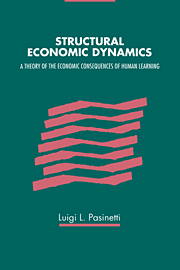Book contents
- Frontmatter
- Contents
- Preface
- Acknowledgements
- List of symbols
- I Economic theory and the neglect of structural change
- II A pure labour production economy
- III Proportional dynamics
- IV Structural dynamics
- V The evolving structure and level of prices
- VI Consumption, savings, rate of interest and inter-temporal distribution of income
- VII On the evolving structure of long-term development
- VIII From the ‘actual’ towards the ‘natural’ economic system – the rôle of institutions
- IX Boundedness of economic systems, and international economic relations
- References
- Index
VIII - From the ‘actual’ towards the ‘natural’ economic system – the rôle of institutions
Published online by Cambridge University Press: 17 September 2009
- Frontmatter
- Contents
- Preface
- Acknowledgements
- List of symbols
- I Economic theory and the neglect of structural change
- II A pure labour production economy
- III Proportional dynamics
- IV Structural dynamics
- V The evolving structure and level of prices
- VI Consumption, savings, rate of interest and inter-temporal distribution of income
- VII On the evolving structure of long-term development
- VIII From the ‘actual’ towards the ‘natural’ economic system – the rôle of institutions
- IX Boundedness of economic systems, and international economic relations
- References
- Index
Summary
The ‘institutional problem’
Any economic system, taken as a whole, must face an ‘institutional problem’. In the previous chapters, the analysis has been concentrated on the theoretical scheme of what has been called the ‘natural’ economic system of a simple, pure labour, production economy. The natural economic system represents so to speak the framework skeleton of the present theoretical construction. It is a set of relations that possess characteristics of analytical relevance and logical consistency, with strong normative properties.
But the natural economic system does not come into existence automatically. For any actual economic system, the problem arises of inventing and setting up those organizational devices – in other words those ‘institutions’ – which put into motion processes actually able to bring the natural economic system into existence.
This is not an all-or-nothing undertaking. If not in an absolutely accurate and precise way, the natural economic system may be aimed at with a tolerable degree of approximation. This is not a once-for-all undertaking either, as it must take place continually, as time goes on. In a hypothetic perfectly stationary (or proportionally growing) economic system, the setting up of certain institutions rather than others would not really make much difference, except at the outset. The natural features would sooner or later be discovered. Then, once singled out and achieved, they would remain for ever.
- Type
- Chapter
- Information
- Structural Economic Dynamics , pp. 117 - 147Publisher: Cambridge University PressPrint publication year: 1993



